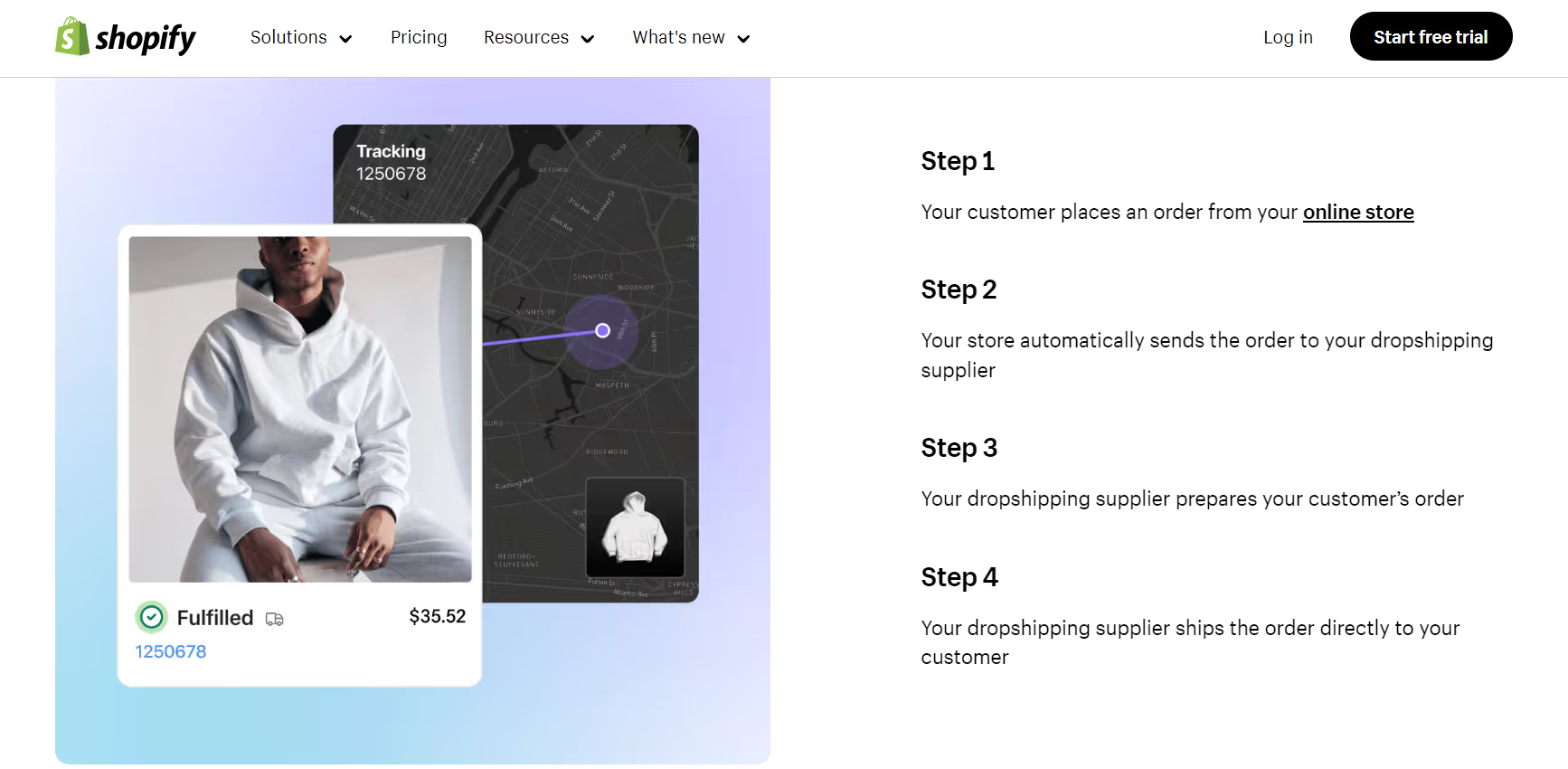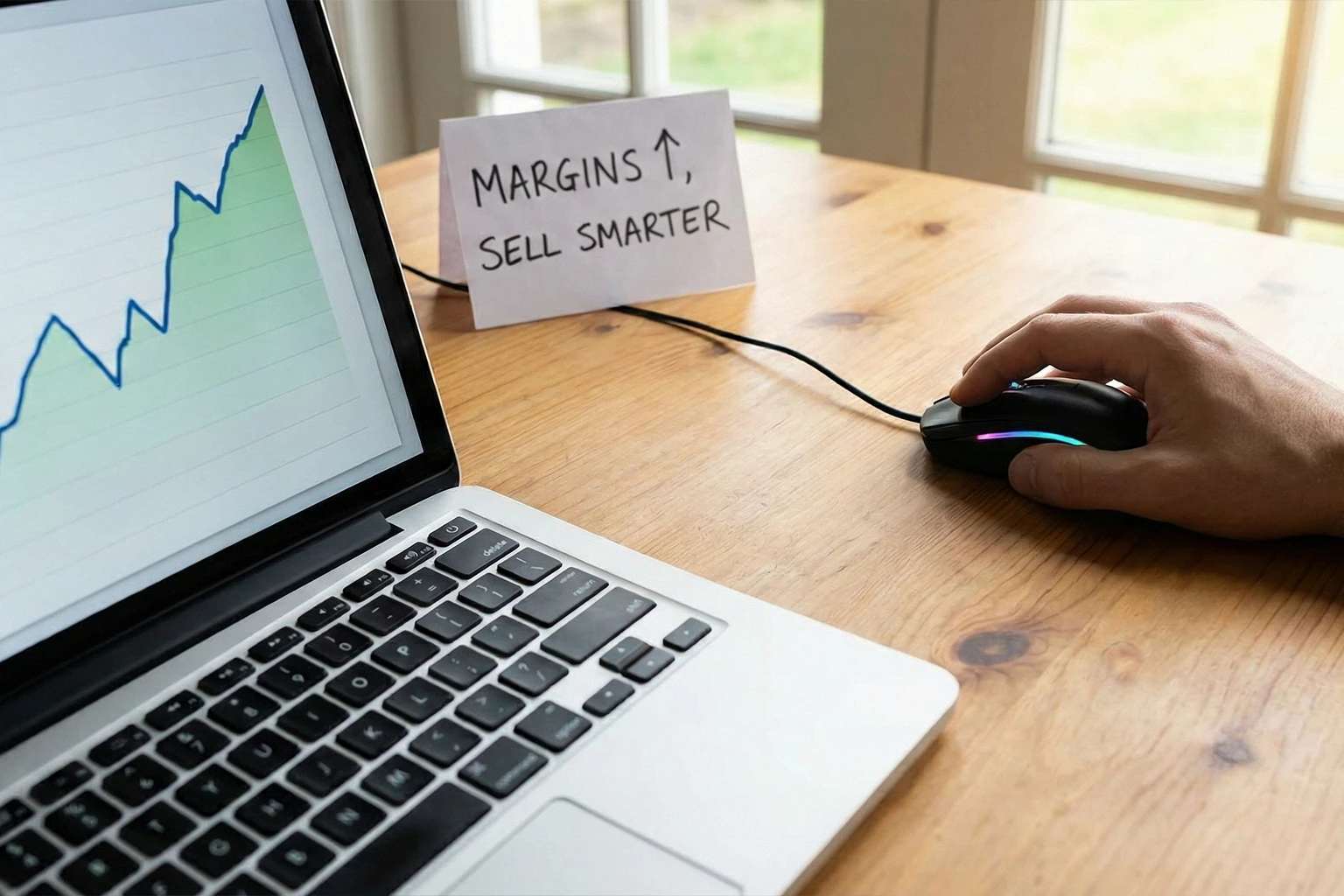.avif)
New to running an online store and unsure whether to go with dropshipping or private labeling? Both models let you sell products without the hassle of managing inventory or shipping.
Curious about which option suits you best? Let's explore the key differences between dropshipping and private label, along with the pros and cons of each, so you can make a better decision for your new business.
What is dropshipping?
Dropshipping is a method of selling pre made products online without having to worry about any of the shipping process. You'll sell supplier's products via your website, and the supplier will still be in charge of all the packing, storing, and shipping. All you have to do is create the online store and market the products.
Currently, about 27% of all online stores use the dropshipping model. It's expected to grow drastically in the next few years, so it's a popular business model for new online store owners.

Benefits of dropshipping
- Low initial investment;
- Wide range of products to choose from;
- Someone else handles storing, shipping, and packaging;
- You'll have more time to focus on other aspects of the business.
Downsides of dropshipping
- You won't have control over product and shipping quality;
- Lots of competition;
- Offering unique products is difficult.
Dropshipping is a great option for beginners with its low startup costs and easy setup, but it’s gotten a bit of a bad rap lately. Customers are starting to expect more, like faster shipping and personalized products, which can be tricky with dropshipping since you don’t have much control over quality or customization.
It’s still a solid way to get into ecommerce, but standing out means finding ways to offer something unique, even if someone else is handling the logistics.
What is private labeling?
In short, private label is a business model where a product is manufactured by one company but sold under another company’s brand name.
Private labeling means selling products with your unique branding, but it doesn't always mean you're selling a generic item.
Private labeling can offer many levels of customization, including products that are specifically created for your brand but manufactured by another company.
You can add your own branding, tweak packaging, or even work with manufacturers to create custom products that reflect your brand identity. Whether you're dropshipping or handling storage yourself, private labeling is a great way to stand out from the crowd with something uniquely yours.
What is private label dropshipping?
Private label dropshipping is a business model where a third party handles the manufacturing, storage, and shipping of products, but the retailer customizes the product's branding and packaging.
Instead of selling generic products, you get to add your own branding, packaging, and design, making the products truly yours. You don’t have to worry about production, storing, or shipping—your supplier handles all that.
Essentially, it combines the low-risk aspect of dropshipping with the ability to offer products under your own private label, helping your business stand out in the market.

Benefits of private labeling
- Offers you more control over product;
- Someone else still handles storing, shipping, and packaging;
- You'll have lots of time to focus on other business aspects;
- Your products can stand out more;
- Less competition.
Downsides of private labeling
- Usually will be more pricey;
- Not all aspects of the product can be customized;
- You may need to meet a minimum order quantity for your supplier.
Main differences for dropshipping and private labeling
Even though private label dropshipping can be a form of dropshipping, the two options are still very different. Private labeling can be a huge advantage for some businesses, but it could add new concerns for others.
When it comes to private label and dropshipping, you'll need to decide which is the best fit for your business.
Storage and shipping
Dropshipping is popular because it takes the responsibility of storing and shipping out of your hands. That makes it easier for new business owners to focus on other areas of their brand. You won't get to ensure quality control, but you also won't have to worry about storing inventory yourself.
Private label businesses can go either way. Some require you to store your private label products yourself and ship them out. There are also plenty of private label dropshipping options that allow you to put your branding on products without handling the shipping part.
A private label business most oftentimes will offer more flexibility than regular dropshipping. With dropshipping, someone always does the packing and shipping for you.
Upfront investment
Starting a new business can be pricey, but dropshipping helps keep the initial investment low since you don’t need to buy products upfront. The supplier handles everything from stock to shipping.
Private labeling, though, may have higher costs if you're buying in bulk and storing products yourself.
With private label dropshipping, you skip holding stock, but custom branding can increase the cost. Some companies offer print-on-demand, which lowers upfront expenses. Don't forget other startup costs, like website hosting or marketing tools, as part of your overall budget.
Product options
With standard dropshipping, you can sell almost any product type you want if you can find a dropshipping supplier to work with. As long as there isn't anything copyrighted involved, you should have no problem finding and selling the products of your choice.
However, using private label products limits your options slightly. With private labeling, you can only choose from products that you can easily add your own customization to. If you have a specific product in mind, you'll need to find a dropshipping supplier that offers a product of that type.
Some private label product ideas include clothing, coffee, skincare, supplements, electronics, and pet care.
Branding and customizability
The biggest difference between dropshipping and private label dropshipping is branding.
A private label dropshipping supplier offers a lot more customization than standard dropshipping. With private labeling, you'll have more control over the look of your products.
Customizability is important because it helps you build a successful brand. If customers buy your products and love them, they'll be more likely to support you again if they recognize your logo and branding.
With regular dropshipping, that's not possible, but with private label products, every product will be linked to your brand.
Profit margins
Profit margins are often higher with private label dropshipping. With regular dropshipping, you'll likely be selling generic products.
With private labeling, your products get a unique look that can help build trust and loyalty with customers, often allowing you to charge more. However, your profitability depends on the type of products you choose.
If your private label products are in an oversaturated market or aren’t following current trends, they may be less profitable than regular dropshipping options.
Choosing the right products is key to standing out and maximizing your profits in the competitive market
For example, dropshipping coffee can be profitable, especially if you use private labeling. Coffee is in demand, but it doesn't have too much competition.
Having unique branding on it and following ideal marketing strategies can help you ensure your dropshipping coffee business works well.
Customer experience
Some private label dropshipping suppliers let you add personal touches, like custom notes or thank you messages with your shipments.
This is a great opportunity to connect with your customers, offering them info on how to follow your brand or get in touch. These small, thoughtful additions can go a long way in building customer loyalty.
With private labeling, you have more control over these personalized details, helping you strengthen relationships with your buyers and make your brand more memorable.
Other ways to sell products without inventory management
Dropshipping and private label dropshipping aren't the only ways for new business owners to run online stores without inventory. Here are a few more options you may want to consider.
Print-on-demand
Print-on-demand is a model that only prints products when orders come in. This typically applies to products that you can print a design on, such as clothing, tote bags, and mugs.
This option is great because no one has to store customized inventory. The designs are only printed onto the products before they're shipped out. While it's a convenient choice, it only works for certain product types.
Selling digital products
If you have products you can sell digitally, they're no need for anyone to hold inventory. These items could include music, ebooks, online courses, and photos. Of course, you will need to dedicate some time upfront to creating these items, but once you're ready to sell something, it's all done virtually.
By only selling digital products, you can save time and money on storing, packing, and shipping. Then, you'll have extra time to focus on other areas of your business.
Fulfillment by Amazon (FBA)
If you're selling products online via Amazon, you can use FBA as a way to store and ship your products through Amazon fulfillment centers.
The manufacturer can ship the products to Amazon so everything will be shipped out with Amazon packaging to make the brand identity feel more reliable.
Private label vs dropshipping: which is the best for you?
Private labeling and regular dropshipping are both excellent options for people who want to run a store without handling inventory. Both have their pros and cons, so which is best for you depends on your specific needs.
If you want to get your business up and running right away and personalized branding is not a focus of yours, traditional dropshipping will be a better option for you.
If you want a similar business model but with your own branding on products private label dropshipping is the way to go. Yet, if you don't mind extra work, you could consider a private label business that requires you to store and ship products from your home.
No matter what you choose, every option can lead to success with enough dedication. Think about what products you want to sell and how you want to sell them. Knowing this can help you determine your storage and shipping method.
Once you have all the initial details figured out, you'll be ready to move forward with your new online store.
FAQ
It depends on your business needs. If you want to have control over the product quality and shipping standards, it's better to ship the products yourself. If you'd rather have time to focus on other areas of the business, you can use dropshipping to have someone else handle storing and shipping.
A dropshipping business can be profitable, but not every one is. It depends on the products you choose and the way your business is run. It's often difficult for new dropshipping businesses to stand out, which is why many store owners turn to private label dropshipping.
Yes, dropshipping business models are beginner-friendly. As long as you have access to a computer and internet, you can make it work. Many beginners turn to dropshipping or private label dropshipping for selling because it takes some of the responsibility out of their hands.
Yes, you can use private labeling for selling products on Amazon. The easiest way to do so is to use the Fulfillment By Amazon (FBA) program. Many sellers also use Shopify for private label dropshipping.
With private label dropshipping, you're usually sourcing the products directly from a manufacturer. The third party manufacturers can use your branding on their existing products.
Related blogs

Dynamic Pricing Calculator: Optimize Margins and Sell Smarter With Every Click
.avif)
Safety Stock Calculator: Instantly Find the Right Buffer Stock for Any Product
.avif)
Cart Abandonment Rate Calculator: Understanding and Maximizing Your E-Commerce Conversions
.avif)

